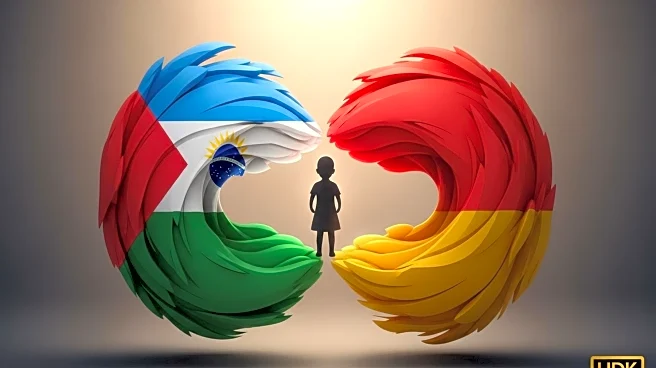What's Happening?
The Trump administration is preparing to repatriate hundreds of Guatemalan children currently in U.S. government custody. These children arrived in the United States unaccompanied and are awaiting release to relatives or guardians. The administration has identified over 600 children from Guatemala in the custody of the Health and Human Services Department for potential deportation as part of a pilot program coordinated with the Guatemalan government. The initiative is described as repatriation rather than deportation, suggesting voluntary departure. However, advocates express concern over the children's understanding of their removal, as many lack legal representation. The administration has implemented measures such as welfare checks, expedited immigration proceedings, and interviews with children in custody, aiming to enhance vetting procedures.
Why It's Important?
This policy shift could significantly impact the lives of unaccompanied migrant children, who are often fleeing violence and seeking safety in the U.S. Critics argue that the administration's approach may violate child welfare mandates and established protections under the Trafficking Victims Protection Reauthorization Act. The move could also strain U.S.-Guatemala relations and affect immigration policy debates. The decision to repatriate children without ensuring their safety in their home country raises ethical concerns and may lead to increased scrutiny from human rights organizations and lawmakers. The policy could further polarize public opinion on immigration and child welfare issues.
What's Next?
Democratic Senator Ron Wyden has requested the immediate termination of the repatriation plans, citing whistleblower accounts. The administration's actions may face legal challenges and public protests. Advocacy groups are likely to intensify efforts to protect the rights of migrant children and ensure compliance with federal laws. The administration may continue to refine its immigration policies, potentially leading to further changes in the handling of unaccompanied minors. The situation may prompt discussions on broader immigration reform and the role of international cooperation in addressing migration issues.
Beyond the Headlines
The repatriation initiative highlights the complex interplay between immigration enforcement and child welfare. It raises questions about the ethical responsibilities of governments in protecting vulnerable populations. The policy may influence long-term shifts in U.S. immigration practices, particularly regarding unaccompanied minors. It also underscores the challenges of balancing national security concerns with humanitarian obligations. The administration's focus on self-deportations reflects a broader strategy to reduce undocumented immigration, which could have lasting implications for U.S. immigration policy and international relations.








